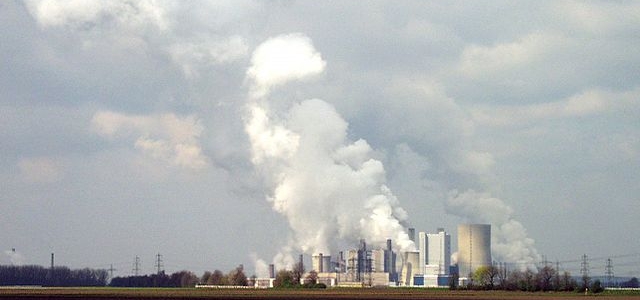A proposal by energy think tank Agora Energiewende for phasing out coal in Germany by 2040 aims for a grand political compromise. It is well-considered in terms of policy, yet a viable coal consensus will nevertheless require continued pressure from the bottom up, finds Stefanie Groll.

According to Agora Energie’s proposed plan, the use of coal to generate power will be over by 2040. (Photo by Harald Hillemanns, modified, CC BY-SA 3.0)
Agora Energiewende, a think-tank, has published an 11-point plan for the gradual decarbonization of the electricity sector in Germany (short summary available in English). The decarbonization is to be founded on a “national coal consensus”. According to their proposed plan, the use of coal to generate power will be over by 2040. The central tenet of the plan is that the transition to renewable energies can only be ecologically successful if it is also economically viable. The entire process draws upon the first nuclear ban consensus established by the German government and the energy companies in 2001.
The proposal could be testing the waters for German Energy Secretary Sigmar Gabriel’s coal policy strategy: how will the unions, industry associations and energy companies respond to it? The German Press agency has reported that Gabriel wants to establish a roundtable on the future of coal in Germany that brings together all of the above stakeholders.
So what exactly is Agora proposing? Agora proposes allowing life span times of older and less efficient coal power plants to be transfered to more efficient coal plants in order to increase flexibility of the utilities. This proposal can be compared to the nuclear consensus, where the oldest and least efficient reactors were to be decommissioned first, while permitting their remaining legal life span to be transferred to more efficient reactors, of course subject to special approval by the Ministry for the Environment.
If a decommissioning schedule for coal power plants were to be established, the government would in turn refrain from “additional climate protection regulations”. In other words, there would be no additional pricing of carbon emissions (so-called “climate contributions”), but also no decommissioning premiums (so-called “climate and capacity reserves”). Neither would it affect stricter air quality rules and public health regulations of coal power plants. This also resembles the nuclear ban consensus: in exchange for shortening the life span of nuclear power plants, then-Chancellor Schröder agreed not to tighten nuclear safety standards further.
According to their own figures, energy companies set aside around €4.1 billion in 2014 for this purpose alone. Whether this amount will prove sufficient and whether these reserves are secure cannot be answered objectively today. Agora recommends independent assessments to ensure greater transparency in this regard and proposes a levy of €2.50 per MWh. All resources to finance reclamation and post-closure site management are to be put into a public endowment fund. It is in the interests of all involved parties to find a more reliable solution here than that for nuclear waste. Where to dump the nuclear waste still remains an open question even after the ban was decided.
Without pressure from the bottom up, there can be no compromise
“Germany needs to abandon coal within the next 15 to 20 years,” says Annalena Baerbock, Climate Policy Spokesperson of the Green Party’s parliamentary group in the German Parliament. A detailed decommissioning schedule by Greenpeace, for example, envisages the last lignite power plant to shut down in 2030, and the last hard coal power plant going offline in 2040.
For the anti-coal movement, the Agora plan leaves considerable room for improvement. The movement should be pushing for a faster exit and a further decentralization of the national energy system based on renewable energies. An incremental, legally anchored phase-out plan, its underlying economic premises and power structures are not likely to pacify more antagonistic climate activists. Instead, these groups want to make sure that the end of coal is also the end of the energy system as they see it: a conglomeration of large capitalist corporations that exploit natural resources (especially fossil fuels) and human labor while doing nothing for the common good. The climate movement will remember what happened to the anti-nuclear movement in Germany after the government announced the shut-down of all German nuclear plants by 2021: It stymied the anti-nuclear movement tremendously because people felt that the nuclear issue was solved. Yet it remains unsolved. Nuclear power is still very much part of the energy game in many parts of the world.
It is good that there are these rather radical positions in the German coal debate. There won’t be a consensus without maximum pressure from the bottom up. You need extreme positions to find the political middle ground. The Agora Paper will trigger a lot discussion. Good start!
Stefanie Groll is the head department for ecology and sustainability at the Heinrich Böll Foundation.
German coal is already worthless reports the Swedish press today:
http://www.svd.se/vattenfalls-affar-kan-bli-en-jattebesvikelse
Machine translation:
https://translate.google.ie/translate?sl=sv&tl=en&js=y&prev=_t&hl=en&ie=UTF-8&u=http%3A%2F%2Fwww.svd.se%2Fvattenfalls-affar-kan-bli-en-jattebesvikelse&edit-text=
( note that the prices reported are in SEK/Swedish Kronar, the exchange rate is roughly 10 SEK for 1 €)
Greenpeace wanted € 2 billion to take over the lignite.
STEAG offered € 300 million.
The three Czech want it for free – if at all.
What are the bets: will Vattenfall ad Moorburg and the atom power plants to make Greenpeace a successful bidder?
German power prices are in the free fall:
http://www.eex.com/en/market-data/power/futures/phelix-futures#!/2016/01/25
The German state’s coffers have to bail out the poor Eastern Germans. First the political Wende and now the Energiewende … Money for building power storage capacities – since they’ve burned the existing ones. But only for another 25 years:
https://www.rbb-online.de/wirtschaft/thema/braunkohle/beitraege/brandenburg-lausitz-braunkohle-Ausstieg-hendricks-stellt-Foerderung-in-Aussicht.html
Machine translation:
https://translate.google.ie/translate?sl=de&tl=en&js=y&prev=_t&hl=en&ie=UTF-8&u=https%3A%2F%2Fwww.rbb-online.de%2Fwirtschaft%2Fthema%2Fbraunkohle%2Fbeitraege%2Fbrandenburg-lausitz-braunkohle-Ausstieg-hendricks-stellt-Foerderung-in-Aussicht.html&edit-text=
The heavy metals released in the atmosphere by burning fossil fuels make the brains work slow. For some parts of the country it takes 2 generations to arrive in reality – with the aid of wheelchairs.
[…] and thinktanks have floated the idea of a coal phaseout timetable, as the UK is now committed to. Yet the idea […]